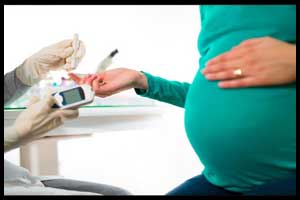- Home
- Editorial
- News
- Practice Guidelines
- Anesthesiology Guidelines
- Cancer Guidelines
- Cardiac Sciences Guidelines
- Critical Care Guidelines
- Dentistry Guidelines
- Dermatology Guidelines
- Diabetes and Endo Guidelines
- Diagnostics Guidelines
- ENT Guidelines
- Featured Practice Guidelines
- Gastroenterology Guidelines
- Geriatrics Guidelines
- Medicine Guidelines
- Nephrology Guidelines
- Neurosciences Guidelines
- Obs and Gynae Guidelines
- Ophthalmology Guidelines
- Orthopaedics Guidelines
- Paediatrics Guidelines
- Psychiatry Guidelines
- Pulmonology Guidelines
- Radiology Guidelines
- Surgery Guidelines
- Urology Guidelines
Gestational diabetes may lead to diabetes in children: CMAJ

Children and youth of mothers who had gestational diabetes during pregnancy are at increased risk of diabetes themselves, according to new research published in CMAJ (Canadian Medical Association Journal)
Gestational diabetes is high blood sugar that develops during pregnancy and usually disappears after giving birth.It can occur at any stage of pregnancy but is more common in the second half.
Early detection of diabetes is important in children and youth, as many -- about one-quarter -- are diagnosed when seeking care for diabetic ketoacidosis, a potentially life-threatening complication of diabetes.
"Although type 1 and type 2 diabetes in parents are well-established risk factors for diabetes, we show that gestational diabetes mellitus may be a risk indicator for diabetes in the mother's children before age 22," says Dr. Kaberi Dasgupta, a clinician-scientist from the Centre for Outcomes Research and Evaluation (CORE) at the Research Institute of the McGill University Health Centre.
The study of 73 180 mothers compared data on randomly selected single births from mothers with gestational diabetes to births from mothers without gestational diabetes. The incidence -- the number of new cases -- of diabetes per 10 000 person-years was 4.5 in children born to mothers with gestational diabetes and 2.4 in mothers without. A child or teen whose mother had gestational diabetes was nearly twice as likely to develop diabetes before the age of 22 years. The association was found in children from birth to age 22 years, from birth to 12 years, and from 12 to 22 years.
"This link of diabetes in children and youth with gestational diabetes in the mother has the potential to stimulate clinicians, parents, and children and youth themselves to consider the possibility of diabetes if offspring of a mother with gestational diabetes mellitus develop signs and symptoms such as frequent urination, abnormal thirst, weight loss or fatigue," says Dr. Dasgupta.
Following are the major recommendations: http://www.cmaj.ca/lookup/doi/10.1503/cmaj.181001

Disclaimer: This site is primarily intended for healthcare professionals. Any content/information on this website does not replace the advice of medical and/or health professionals and should not be construed as medical/diagnostic advice/endorsement or prescription. Use of this site is subject to our terms of use, privacy policy, advertisement policy. © 2020 Minerva Medical Treatment Pvt Ltd